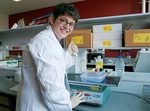Healthy diet for unborn baby has impact on adult health
 Physiology Physiology
University of Adelaide research has shown the importance of healthy eating before becoming pregnant on the future health of the child. Research by Dr Severence MacLaughlin, who graduated from the University in December with a PhD, found that a mother's nutrition and the environment of an embryo in the first few days of life - even before implantation in the uterus - can influence the potential for adult diseases such as cardiovascular disease and diabetes. Dr MacLaughlin said research using sheep as a model of human pregnancy found undernutrition during the period from fertilisation to day seven altered the development of the fetus and placenta during pregnancy and 'programmed' the fetus for disease in later life. The research team has also shown this early environment can influence the timing of birth. Very recent data suggests the effects of diet could be seen even earlier, in mothers' eggs still within the ovary before conception. "It has been known for about 20 years that poor maternal health during pregnancy can have detrimental effects on adult health outcomes, but for the maternal environment around the time of conception to be shown to have these effects is very significant," Dr MacLaughlin said. "To put it in context, how many women know they are pregnant during the first week of life? Through their diet and social habits women with unknown pregnancies could be having an impact on their child's health for its entire life." In their research with sheep, the researchers found that 30% undernutrition altered the chemical "signal" from mother to the developing embryo, which impacted on the development of the placenta and fetus. "We found that maternal undernutrition during these few days alters fetal growth and weight due to changes in the development of the placenta. There are also changes to the cardiovascular and kidney development of the fetus during very early and late gestation," Dr MacLaughlin said. "This may be setting the scene for the development of adult disease." Associated research has also found that the importance of the embryonic environment during early development has significant potential impact for the health of those born using IVF and other artificial reproductive technologies. "We know from our studies that just the use of embryo transfer without culture causes changes in heart, fat, fetal and placental development," Dr MacLaughlin said. "The use of culture conditions exacerbates this situation." The research team has shown for the first time that the sheep model of human pregnancies reflects observed outcomes resulting from in vitro culture used as part of artificial reproductive technologies. "We now have an animal model that closely resembles the human pregnancy unlike the mouse or rat. We can use this model to further study long-term health implications of in vitro culture," Dr MacLaughlin said. Dr MacLaughlin completed his PhD within the Discipline of Physiology in the School of Molecular & Biomedical Science at the University of Adelaide. His PhD supervisors were Professor Caroline McMillen, now Pro Vice Chancellor for Research and Innovation at UniSA, and Dr Simon Walker, Turretfield Research Centre, South Australian Research and Development Institute. Story by Robyn Mills
|





